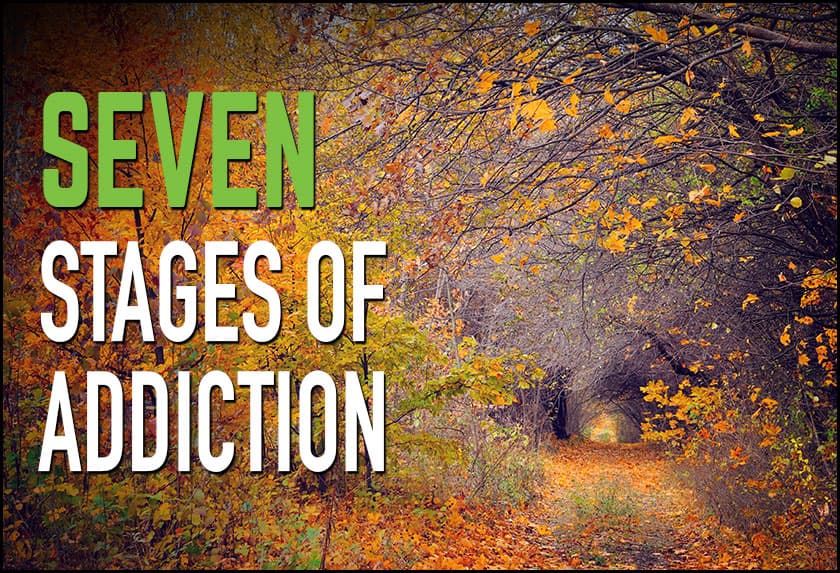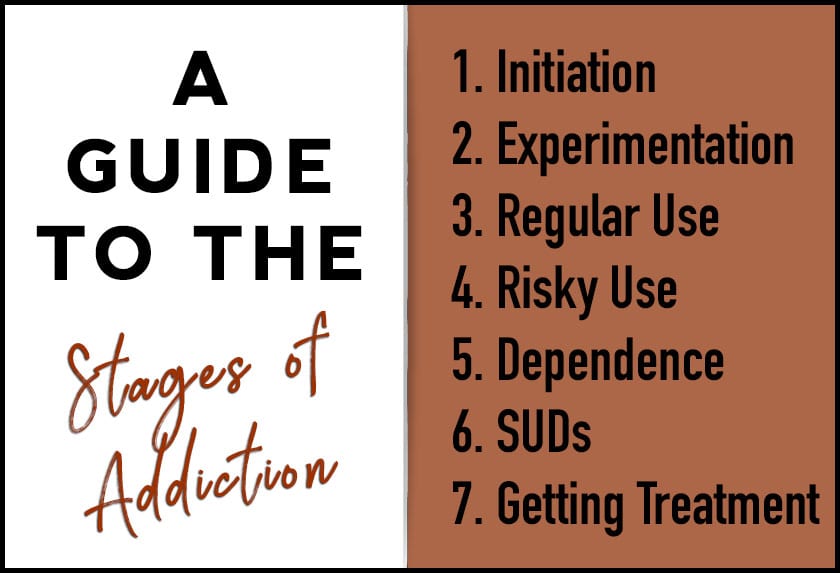For those who have never experienced addiction in themselves or a loved one, it may not seem like a complex issue. However, it’s important to note that there are actually many stages of addiction to consider, meaning that there are different symptoms to take note of and try to manage.
Over 19.7 million people over the age of 12 struggled with a substance use disorder as of 2017. The issue is incredibly widespread and needs to be taken seriously. Here’s a guide to the 7 different stages of addiction, and how they affect the addicted person and their loved ones.
The First Stage of Addiction– Initiation
The first stage of addiction is, of course, being introduced to drugs and alcohol.
Typically, most people will be presented with these substances before they have fully come into adulthood. Between peer pressure, general curiosity, or even an underdeveloped prefrontal cortex causing poor impulse control and decision-making skills, it’s very easy for young adults to succumb to the temptations of alcohol and drugs.
Now, some teens may have a drink or try an illegal drug and not have the urge to continue engaging in that behavior. For others, this may be a slippery slope into larger quantities and more dangerous substances. There are several variables when it comes to whether or not a young adult will continue on a dangerous path:
- Mental illnesses– ADHD, anxiety, bipolar disorder, depression, etc.
- Homelife– dealing with physical, emotional, or sexual abuse, family members with mental illness, negligent guardians, and alcohol/drug abuse.
- Friends– having peers who engage in illegal alcohol and drug activity.
- Availability– whether or not they can easily obtain the substances themselves.
No matter the reason, it’s essential to discuss the potential dangers and addictions that using drugs and alcohol bring with young people and even adults who could be exposed to them for the first time.
The Second Stage of Addiction – Experimentation
After the initial stage comes experimentation, which starts when someone uses addictive substances in specific situations. For example, a high schooler may use drugs and alcohol at local parties, while adults may do so after a long day or work or during times of high stress.
Using drugs and alcohol at this point will typically be associated with either having a good time or releasing stress or even both. There are not really any consequences at this point, and people in this stage are generally not going to have excessive cravings for the substance in question. The decision to use is conscious and is easily controlled by the user.
Even if there is a binging aspect to someone’s drinking or drug use at this point, it can still stay within the experimentation stage. There is still a conscious choice to partake in these actions, and most of the binging is done during a certain time of the week or month, rather than sporadically or regularly.
Drinking and drug use (depending on the substance, of course) is low risk at this point. While it’s not as dangerous as other stages, low risk should not be taken to mean that there is no risk at all. Alcohol specifically could still cause some damage at this point if it is consumed too quickly, or by someone who is on certain medications. Drug use at this stage could still be risky depending on the drug in question or the quantity being consumed.
The Third Stage – Regular Use
When talking about the stages of addiction, regular use comes in at number 3. It is at this point that the user has a predictable pattern to their drinking and alcohol consumption. Now, this does not necessarily mean that the user is taking the substance every single day, just that they do so regularly and normally under similar circumstances each time. Meaning that someone who normally drinks or takes drugs when they are stressed or lonely is going to do so consistently when they feel that way.
People at this stage will also most likely use their substance of choice in settings where they are completely alone more frequently as well. While they may still drink/take drugs in front of others, it’s going to affect their alone time, as well as their personal and work lives too. Work, school, and other obligations may start to be missed, and tasks may slip through the cracks as usage becomes more regular.
The Fourth Stage – Risky Use
Once someone has passed the stage of regular usage, they enter into risky or problematic use. At this point, the drugs and/or alcohol has begun to seriously and negatively impact the user’s life, and the issue will have started to seep into personal and professional relationships.
The fourth stage is where DUIs and DWIs may start to happen, there may be negative performance reviews or grades for school and work, and relationships with spouses, family, and loved ones may start to become strained. The user may also be running with a different crowd altogether now, meaning that they have chosen to spend more time with other drug and alcohol users instead of their old friends or even family.
It is at this point that there are heavier risks to the substance abuse. However, it does not qualify for a disorder yet. Regardless, it’s still vitally important to get help at this stage, or any other stage of addiction before it gets more serious.
The Fifth Stage – Dependence
When it comes to the fifth stage of addiction, which is dependency, there are several smaller steps it consists of. Meaning that there are levels of dependency, a drug or alcohol abuser may not have them all at once. It also means that they can get more serious over time.
The levels of dependency include:
Becoming Tolerant of the Substance
The first level of dependency is simply becoming tolerant of the substance the user has been regularly taking. Meaning that in order to achieve the same level of drunkenness or high, they need to consume a larger quantity of the drugs and/or alcohol.
Over time, this can lead to severe health and mental issues as the dosages become larger and larger. These can include anything from heart disease, liver damage, anemia, and cancer, to mental issues like paranoia, aggression, and hallucinations.
Having a Physical Dependency
Once someone has crossed the tolerant stage of dependency, they enter into having a physical dependency on drugs or alcohol. Meaning that their body actually elicits a physical withdrawal response when they go without their substance of choice.
However, physical dependency can occur with other substances as well. If someone is prescribed a pain killer or other medicine by their doctor, their bodies can become accustomed to that as well. With alcohol and drugs that are being heavily abused, however, it’s a much stronger and more dangerous response.
Having a Psychological Dependency
Lastly, psychological dependency can occur with a dependent drug/alcohol abuser. It’s a combination of the first two levels of dependency, using a larger quantity of the substance over time and experiencing physical cravings and withdrawal symptoms, while also adding on trying to quit and then using again. It is also commonly referred to as a chemical dependency.
These stages build on each other, meaning that someone with a psychological dependency is both physically dependent and has developed a tolerance. However, someone who has developed a tolerance is not necessarily physically and psychologically dependent, at least not yet.
The Sixth Stage – Substance Use Disorder (SUDs)
The sixth stage of addiction is one for people officially suffering from a substance use disorder. It is by far the most serious and damaging stage and is, therefore, the most difficult to recover from.
Those with a substance abuse disorder:
- Have given up activities they previously enjoyed
- May be avoiding their friends and family
- Cannot face their lives without the help of alcohol or drugs
- Cannot control their usage
- Continually use despite health complications and safety risks
- Cannot recognize and see the issues with their own behavior and their relationships with others
A substance use disorder is one that people frequently relapse from, so recovery can often by incredibly disheartening for users. Typically, someone who is recovering from a SUD will have at least one or more setbacks, and some may never recover.
Since repeated substance use fills the user’s brain with dopamine, they will start by using more and more of the drug/alcohol in question for the same effect, and eventually, it keeps their brains from producing the dopamine it needs by itself. Thus, the user needs to continually use to feel happiness or even just normal.
Substance abuse disorders affect almost every part of the brain, including – emotion, judgment, learning, moving, and other aspects that will not be able to function as they would normally.
The Seventh Stage of Addiction– Getting Treatment
The last and most hopeful stage is getting treatment for a SUD. It’s the process of trying to regain control over habits, health, life, and general wellbeing.
The seventh stage will begin after first detoxing from the substance in question. After this point, it’s typically best to combine medication with behavioral therapy. For those in rehab, the longer they stay, the less likely the user is to relapse later on. When choosing a course of treatment, slow and steady is the best solution. There’s no way to get over this quickly.
Group counseling is an excellent choice as well, in addition to other courses of treatment. Users have many options, including AI-Anon, Nar-Anon, AA, and NA, depending on what substances they are recovering from.
Recovering from Any of the Stages of Addiction
The best first step for any substance user to take is to realize where they are when it comes to the stages of addiction. Knowing what their level of addiction allows them to seek help and converse openly with a medical professional or counselor for treatment.
Also, for those with a loved one suffering in one of the stages of addiction, knowing where they stand is great when attempting to speak to them about the issues at hand or discussing possible treatment options with them. Recovery is certainly difficult, but not impossible – remaining hopeful and aware of the problems at hand are vital for anyone struggling within the stages of addiction.














